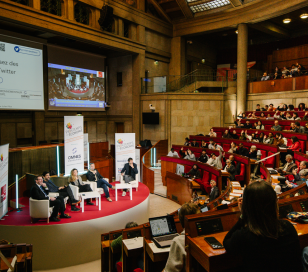Le centre de recherche INSEEC est un espace d’échange multidisciplinaire garant de la mise à jour constante et prospective des connaissances

Directeur de la Recherche
Les actualités du centre de recherche

Nos chercheurs, intervenants au Printemps de l’économie 2024
Lire la suite
Fabienne Bornard devient la Rédactrice en Chef de la Revue Entreprendre Et Innover
Lire la suite
Prix de thèse AGRH et ANDESE décernés à Emilie POLI
Lire la suite
INSEEC Research Center relance les mardis midis de la Recherche
Lire la suite
Nouveaux axes de recherche – INSEEC Research Center
Lire la suiteZoom sur les travaux des enseignants-chercheurs
Nouvelle étude de cas : WE GO GREEN
Par Camille SAINTIVES et Hélène MERAL INSEEC Grande Ecole BordeauxWine Economic & Business Symposium 2022
Nos chercheurs INSEEC Grande Ecole au salon mondial vitivinicole VINITECH-SIFELLes politiques climatiques : entre techno-optimisme et déni de réalité – The Conversation
Par Philippe NACCACHE et Julien PILLOT (INSEEC Grande École)Vins de Bordeaux : Jean-Marie Cardebat, l’économiste qui pense que l’arrachage du vignoble est une erreur
Par Jean-Marie CARDEBAT (INSEEC Grande École)La Recherche
Nous développons une recherche en phase avec les attentes des entreprises avec le souci de travailler sur des thématiques qui les concernent et pour lesquelles elles sont prêtes à investir.
Nos axes de recherche permettent de renforcer l’impact de la recherche et des contributions intellectuelles de l’école sur la pédagogie et les enseignements à travers une stratégie centrée sur les besoins des entreprises et la prise de position sur les grandes questions de société.
LES AXES DU CENTRE DE RECHERCHE INSEEC
Transitions sociétales : exploration des comportements émergents et des pratiques commerciales
Ce thème de recherche adopte une approche interdisciplinaire et multi-niveaux, explorant les impacts intrinsèques des transitions sociétales telles que l’adoption de l’intelligence artificielle, la transition numérique et l’innovation managériale. Il couvre un large spectre de comportements et de pratiques, des habitudes de consommation individuelles aux décisions stratégiques des dirigeants et des managers, tout en intégrant les défis des politiques de ressources humaines et de la dynamique organisationnelle.
Écosystèmes durables : évaluation de la gouvernance, de la gestion des risques et de la création de valeur
Dans un monde en constante évolution, caractérisé par l’émergence de nouveaux instruments financiers et les défis du développement durable, cet axe de recherche se concentre sur l’évaluation des écosystèmes durables à travers trois piliers clés : la gouvernance, la gestion des risques et la création de valeur.
De l’ancrage des entreprises aux territoires résilients : Les voies d’un développement local durable
Cet axe de recherche explore les dynamiques complexes entre les entreprises et leur rôle dans le renforcement de la durabilité et de la résilience des territoires dans lesquels elles opèrent. Le centre de recherche de l’INSEEC examine les questions de changement social, environnemental et technologique dans les territoires d’une part, et la gestion des interactions dans les territoires, la RSE et l’évaluation des impacts socio-environnementaux des activités humaines d’autre part.
Research Center & Faculty OMNES Education
Notre recherche est coordonnée et soutenue par le Research Center & Faculty OMNES Education, centre de recherche qui joue un rôle clé dans la promotion de la recherche et de l’innovation dans le domaine de l’éducation. Cette entité réunit des experts, des chercheurs et des enseignants pour mener des travaux de recherche, développer des programmes pédagogiques avancés, et contribuer à l’amélioration de la qualité de l’enseignement au sein du groupe OMNES Education. Elle vise à être un hub intellectuel favorisant l’évolution et la diffusion des connaissances dans le domaine de l’éducation.
Cette plateforme de collaboration et de partage de connaissances au sein de l’ensemble de l’organisation, encourage la recherche interdisciplinaire, la formation continue du personnel éducatif et la création de nouvelles méthodologies pédagogiques. En somme, il vise à favoriser l’innovation et l’excellence dans le domaine de l’éducation, en veillant à ce que les meilleures pratiques et les dernières avancées en matière de recherche éducative soient intégrées dans les programmes d’enseignement du groupe OMNES Education.
Pour garantir l’autonomie des écoles et de leurs programmes, tout en respectant leurs spécificités et les normes d’accréditation, cette recherche est conçue de manière “fédérative”. Chaque école peut établir son propre centre de recherche, orienté autour de domaines de recherche alignés sur sa vision stratégique et éducative, et possède son propre conseil scientifique.
Le Conseil Scientifique de l’INSEEC
Président du Conseil scientifique
Yvon PESQUEUX, Professeur en sciences de gestion, CNAM
Membres du conseil scientifique
Patrick BOISSELIER, Professeur en sciences de gestion, CNAM
Ephraim CLARK, Professor Accounting & Finance, Middlesex University
Jean Noel KAPFERER, Professeur Emérite HEC Paris
Kristine NALTCHADJIAN, Directrice Education et Recherche, Microsoft France
Sylvie FAUCHEUX, Directrice des Projets et de la Prospective chez Panthéon-Assas Université
Membres associés du conseil scientifique
Catherine KUSZLA – Dean Recherche OMNES EDUCATION
Guillaume GARNOTEL – Directeur Général INSEEC GRANDE ECOLE & BBA INSEEC
Hachmi BEN AMEUR – Directeur de recherche INSEEC GRANDE ECOLE & BBA INSEEC

Le centre de recherche OMNES Education
Un corpus académique de plus de 120 enseignants chercheurs permanents issus de 25 pays de tous les continents.

